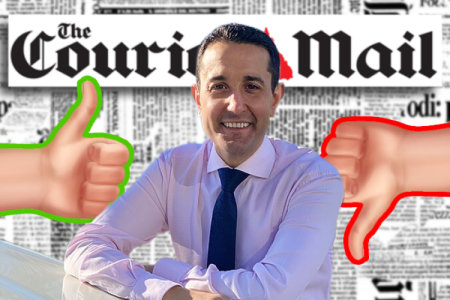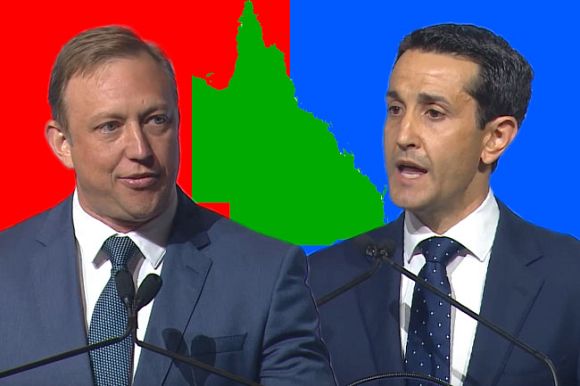Crisafulli's LNP would likely worsen economic inequality, slash public services and delay climate action, writes Craig Hill.
AS QUEENSLAND approaches another election, voters are once again weighing their options between the major political parties: the Labor Party and the Liberal National Party (LNP).
While David Crisafulli's LNP may present itself as a strong alternative, a deeper examination of its track record and policy proposals suggests that Queensland would fare worse under an LNP government than it currently does under Steven Miles' Labor Party — and here's why.
Economic mismanagement
Historically, the LNP's governance of Queensland has been marked by economic mismanagement, often resulting in cuts to public services and higher unemployment rates.
During the term of former Premier Campbell Newman (2012–2015), the LNP slashed over 14,000 public sector jobs in an attempt to reduce the State's budget deficit. (See the full list of the Newman Government cuts here.)
This move not only weakened the public sector but also contributed to a rise in unemployment, with job losses primarily affecting health, education and law enforcement.
In contrast, the current Labor Government has focused on investment in public services and infrastructure, creating more jobs and stimulating the economy.
Labor’s fiscal policies during the COVID-19 pandemic led to Queensland's relatively strong economic recovery compared to other states.
Climate change and environmental policies
Queensland is highly vulnerable to the impacts of climate change, including severe droughts, bushfires and floods.
While the Labor Government has been criticised for not doing enough on climate change, it has made significant progress in transitioning the State towards renewable energy sources, committing to a 50 per cent renewable energy target by 2030.
Labor’s policies include investment in clean energy jobs and a commitment to reach net-zero emissions by 2050.
The LNP on the other hand, has a history of opposing climate action. The party has consistently supported the coal industry and fossil fuel investments, delaying the shift to renewable energy.
Their reluctance to prioritise climate action could put Queensland at a greater risk of environmental disasters and miss out on the economic benefits of the global shift towards cleaner energy sources.
Health and education
Under the Newman LNP Government, Queensland saw significant cuts to healthcare funding, which led to a reduction in hospital services and longer waiting times.
The Labor Government has worked to reverse these cuts, restoring critical funding to hospitals, reducing wait times and investing in frontline healthcare workers.
In education, Labor has focused on funding public schools and expanding early childhood education.
Their initiatives include building new schools and upgrading existing infrastructure, as well as providing funding to improve teacher training and student support services.
The LNP on the other hand, has a track record of deleting funding to public education, which could jeopardise the future of Queensland’s children by creating inequalities in access to quality education.
Public services and social safety nets
Labor governments have traditionally been more supportive of public services and social safety nets that help vulnerable Queenslanders.
The Labor Government has made significant investments in social housing, mental health services and disability support.
The LNP’s approach tends to favour the privatisation of public services, which could reduce access to essential services for low-income and disadvantaged communities.
The LNP's fiscal policy of austerity and spending cuts in the public sector could lead to the erosion of social safety nets, leaving Queenslanders without the support they need in times of crisis.
This was evident during the LNP's last term, where the focus on reducing debt through public sector cuts came at the expense of critical services.
Workers’ rights and fair wages
The LNP has aligned itself with big business and has been less supportive of workers’ rights and fair wages.
Under the Newman Government, industrial relations policies were designed to weaken unions and reduce workers' bargaining power. This led to reduced wages and job security for many Queensland workers.
In contrast, Labor has a stronger track record of supporting workers' rights, ensuring fair wages and improving job security.
The Labor Government has also taken steps to improve workplace safety laws, particularly in industries like mining and construction.
Conclusion
While no government is without its faults, the evidence suggests an LNP government would likely worsen economic inequality, weaken public services and delay climate action, all of which are critical issues for Queensland’s future.
The Labor Party, despite its challenges, has demonstrated a stronger commitment to job creation, public service investment and addressing the climate crisis.
Given these factors, voters should carefully consider whether they want to return to the cuts and economic mismanagement of the LNP or continue with a government that is focused on building a stronger, fairer, and more sustainable future for Queensland.
David Crisafulli and the LNP hid their cuts from Queenslanders until the last possible moment. pic.twitter.com/8fzxbylgzC
— Steven Miles (@StevenJMiles) October 25, 2024
Craig Hill is a Brisbane-based journalist and education consultant, and a keen observer of Australian and Chinese politics. You can follow Craig on Twitter/X @CraigHill01.
 This work is licensed under a Creative Commons Attribution-NonCommercial-NoDerivs 3.0 Australia License
This work is licensed under a Creative Commons Attribution-NonCommercial-NoDerivs 3.0 Australia License
Support independent journalism Subscribe to IA.

Related Articles
- Queensland's so called 'highway to hell' election beat-up
- 'Adult Crime, Adult Time' in Queensland: LNP direct their anger toward children
- Labor fights the trend as election day looms in Queensland
- Queensland conservatives divide state with law and order campaigns
- The day of the troll: Taste-testing Queensland’s democracy sausage














